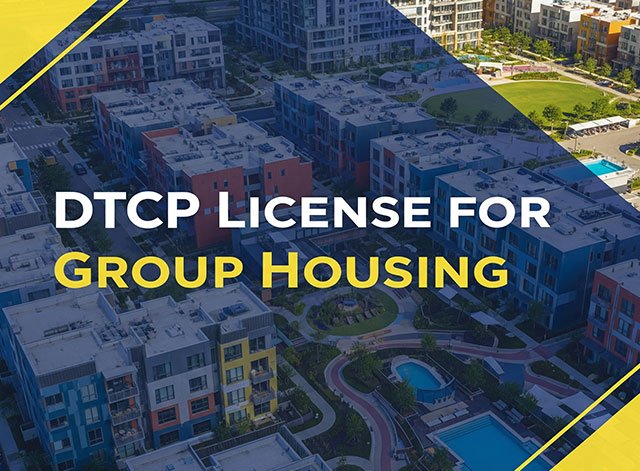DTCP License for Group Housing Projects
Obtaining a license for Group Housing from the DTCP (Directorate of Town and Country Planning) is a crucial requirement for developers planning multi-dwelling residential projects such as apartments, condominiums, and gated communities. This license ensures compliance with land use policies, urban planning norms, and infrastructure guidelines laid out by the state.
Group housing projects involve complex planning components, including density regulations, fire safety norms, green space allocation, and parking provisions. DTCP approval is mandatory before any construction activity begins. Legal experts can guide you through the licensing and sanctioning process to minimize delays and regulatory risks.
Legal Compliance & Planning Norms for Group Housing Licenses
Group housing developments are evaluated against strict planning parameters such as FAR (Floor Area Ratio), layout efficiency, road connectivity, environmental clearances, and structural safety standards. Ensuring compliance with these norms is critical for successful project execution and marketing.
- DTCP License for Group Housing
- Zoning & Land Use Compliance
- Layout Plan Approval & FAR Calculation
- Building Plan Sanctions
- Environmental Clearance & EIA
- Infrastructure Planning (Water, Sewage, Roads)
- Fire Safety & Disaster Management Norms
- Legal Due Diligence & Title Verification
- Completion & Occupation Certificate Assistance
- Parking & Common Area Compliance
- Dispute Resolution & Objection Handling
Policy Regarding Grant of License for Group Housing Colony
The Governor of Haryana, exercising the powers conferred under Section 9A of the Haryana Development and Regulation of Urban Areas Act, 1975, is pleased to issue the following policy for the grant of license.
For the purpose of this policy, the High Density Zone means the residential zone(s) earmarked in the Development Plan wherein the density of population is assigned as 1000 persons per hectare (PPH) or more.
20% of the area of the applied land shall be handed over to HUDA by the applicant for providing the community facilities and open spaces as earmarked by the Department for composite planning of the area. However, the benefit of 100% FAR of the above said handed over area shall be given on the remaining applied land.
It is clarified that the policy dated 19th December, 2006, in so far as it relates to reservation of 20% of the sector area for group housing colony in a particular sector, shall not be applicable to High Density Zones earmarked in the respective Development Plans as Group Housing Colonies are to be set up in this entire zone.
Minimum Land Requirement for Group Housing & Commercial Projects (Haryana)
The minimum land requirement for group housing and commercial projects in India depends on the state's urban development regulations. Below are the general guidelines as per Haryana Urban Development Authority (HUDA) and Town & Country Planning (TCP) Haryana, which govern cities like Gurugram.
Group Housing (Residential) – Minimum Land Requirement
- Minimum Land Area: 5 acres (approx. 20,234 sq. meters) in most urban areas. Higher area may be required based on zoning and density norms.
- Maximum Permissible FAR (Floor Area Ratio): 1.75 to 2.5, depending on the location and sector.
- Maximum Ground Coverage: 35% to 40% of the plot area.
- Parking Norms: 1.5 ECS (Equivalent Car Space) per dwelling unit.
- Green Area Requirement: 15-20% of total land must be green/open space.
Commercial Projects – Minimum Land Requirement
- Shopping Mall / Commercial Complex: 1 acre (4,047 sq. meters) minimum in planned urban areas. FAR: 1.5 to 2.5 based on zoning.
- IT/ITES (Tech Parks, Office Spaces, Co-Working Hubs): Minimum 2 acres for standalone IT parks. FAR: 2.5 to 3.0 in special IT zones.
- Mixed-Use Development (Residential + Commercial): Minimum 10 acres, with a specified percentage for commercial activities.
Note: 20% of the area of the applied land shall be handed over to HUDA by the applicant for providing the community facilities and open spaces as earmarked by the Department for composite planning of the area. However, the benefit of 100% FAR of the above said handed over area shall be given on the remaining applied land.
It is clarified that the policy dated 19th December, 2006, in so far as it relates to reservation of 20% of the sector area for group housing colony in a particular sector, shall not be applicable to High Density Zones earmarked in the respective Development Plans as Group Housing Colonies are to be set up in this entire zone.

Group housing projects require meticulous adherence to statutory norms to avoid costly project delays and legal entanglements. From land zoning checks to layout and building plan sanctions, every stage demands careful legal oversight.
Our legal team provides end-to-end support for DTCP licensing and compliance, ensuring your group housing development progresses smoothly, lawfully, and in alignment with state planning regulations.
Securing a DTCP license for a Group Housing Project involves strict compliance with density norms, infrastructure standards, and layout approvals. Our legal team ensures your project meets all licensing requirements, minimizing risks and expediting clearances.
Planning a Group Housing Project? Our legal experts are equipped to assist you through the entire DTCP approval process—ensuring regulatory compliance, timely sanctions, and project security.


